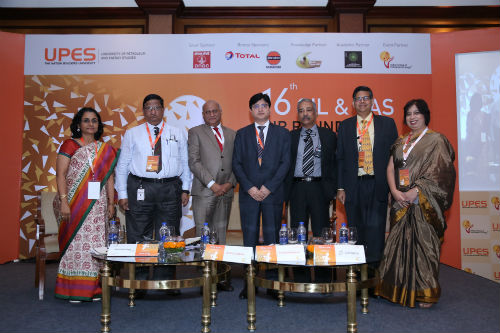‘Industry leaders should promote gender diversity’: UPES 16th Oil & Gas HR Roundtable
Mumbai, September 20, 2017: At a time when Indian and global oil & gas industry is discovering the new normal amidst tumultuous economic scenario and fluctuating commodity prices, there is a need to push for gender diversity, an issue that has been long neglected. Senior women leaders deliberated on ‘Women leadership in Oil & Gas’ at the 16th Oil & Gas HR Roundtable organized by UPES. Nishi Vasudeva- former Chairman & Managing Director, Hindustan Petroleum Corp. Ltd.; Bhavana Chary Samel, Vice President- HR, Total Oil India Pvt. Ltd. and Prajakta Kanaglekar, Senior HR Business Partner- South Asia, Baker Hughes, a GE Company urged organizations in this sector to work towards hiring more female employees, retaining them and developing them for leadership roles.
A recent Ernst & Young survey also highlights the need for diversity to help navigate oil and gas sector disruption and the value diversity brings to the bottom line. The survey findings suggest that ‘without diversity, companies will continue to miss out on innovation and insight to capitalize on future opportunities and drivers of growth. Board and senior management need to create and invest in a varied talent pipeline across all levels and mentor individuals to eradicate the unconscious bias currently holding back some of their top talent.’
In a panel discussion on ‘Transformational Leadership in the New Normal’, Lakshmi Venkatesh, General Manager, Petrofac Engineering India Ltd. said, “Every employee should be a change agent and leaders should be change masters. Leadership has to change the way it is thinking and empower employees at the lower end of the pyramid to take decisions, which will promote agility within the organization”.
P. Raghavendran, President (Refinery Business), Reliance Industries Ltd. said, “The definition of oil and gas industry is changing to being an energy or mobility business and we are looking for human resources who can adapt to these changes. Earlier the industry needed employees with long experience but today it needs talent who has learning agility, who can develop newer business models. We need people with imagination.”
Re-energizing work capital has become another significant task for HR managers in this sector for organizations to adjust to the new normal. At the organizational level there is a need to change competency matrix for new hiring that is in sync with changing industry scenario, constant training of employees, encouraging a culture of innovation and entrepreneurship. At the industry level artificial intelligence, Internet of Things and Business Analytics is going to impact operations in a big way and therefore young employees are required who understand these technologies better. Leaders have to realize that to succeed in this age of disruptions they need to rely on the younger workforce and hence reverse mentoring is extremely critical. Better Industry-academia collaboration is also required to prepare students who are readily deployable in the industry as soon as they graduate.
The panel that consisted of Diptii Das, Head (HR), South Asia, Aramex International; Jayaram Philkana, Chief Human Resources Officer, UPL Ltd., Sanjay Kumar, Vice President (HR), Apar Industries Ltd. also discussed how to develop organization’s ethos in third party employees when uberization of workforce has become a norm. On the issue of conflict of cultures with millennial workforce joining the industry Diptii Das said, “Culture of an organization is like software with new version updates. The original culture doesn’t die; it just gets updated with new culture”.
In sync with industry requirements UPES offers eight under-graduate and five post-graduate specialized programs that are co-designed, co-delivered and co-certified in academic collaboration with leading organizations of the sector.

